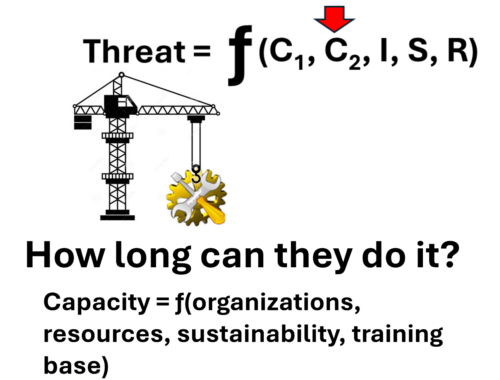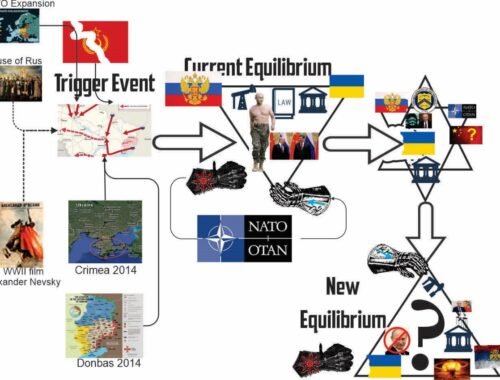
Part 1: Political Movements—Maskirovka and Words Hide Meanings
Abstract: Do words and terms matter? Can political groups hide their agendas in nice sound bites in a game of maskirovka?
Maskirovka 2.0 is a continuation of the old military approach, to which we must add new whole of-government tools, such as: coercion, media manipulation, the employment of fossil fuel energy access and price as a weapon, cyber-attacks, political agitation, use of agents provocateurs, the deployment of military forces in clandestine status, and the development of surrogate forces by providing arms, equipment, training, intelligence, logistic support, and command and control.
I introduce this series with the concept of Humpty Dumpty and Maskirovka because I suspect that is exactly what we see in American politics and social dynamics today. People and groups define terms the way they see fit, often to mask their true intent. This happens on both sides of the political divide. It almost as if they are afraid to let the electorate see their true intentions or the impact of their policies. We seem to see a whole of government approach to maskirovka in some policies, such as taxation and a whole of political party approach to others, such as the underlying political agenda.
In Part 5 of the series on Citizen Resiliency, I quoted Booker T. Washington and Confucius on the value of words and cited a white paper I wrote, See Words Do Matter: Archimedes vs. Atlas?.
“A lie doesn’t become truth, wrong doesn’t become right and evil doesn’t become good just because it’s accepted by a majority.” — Booker T. Washington
“The beginning of wisdom is to call things by their proper name” — Confucius
Over the following parts, I will examine some of these issues, on both sides of the political divide and how people and groups manipulate language and mask their intent. Part 1 introduces the series and discussed the concept of maskirovka and the meaning of words. Part 2 looks at the meaning of names and how they can both inform and misinform. Part 3 looks at the concept of Cultural Hegemony and how it is used to control political power. Part 4 looks at how groups create labels and use them to control a narrative and political discourse. Part 5 looks at culture and whether it really matters. Can we assess and compare cultures? Part 6 looks at the enigma of what is happening in America today and some potential reasons for it.
Some groups we will review include:
- Congress. Many policies are densely written without clear objectives. Tax laws and many other laws are likewise dense and difficult to read.
- Black Lives Matter (BLM). The public purpose is to stop police and other violence against African Americans. However, the organization has Marxist roots, as did The Black Panthers.
- Socialist wing of the Democratic party. They are pretty upfront about some of their ideas, but many state they do not seek a socialist government, but something like Sweden.
- Republican party. They had complete control of the government the first two years of the Trump administration and did what? RINO (Republican in Name Only) is a derogatory term applied to republicans that cooperate with democrats, but what is the real republican agenda and when do they seem to talk a good game, but do very little?
Some concepts we will review are:
- Critical X family of theories, especially Critical Race Theory (CRT). Like BLM, there is a public face that seems to have beneficial motives, but an underlying Marxist doctrine and a potential call to effectively dismantle most western institutions.
- Marxism is the political philosophy behind Communism.
- Socialism is a steppingstone to Communism. Unlike what some American advocates want us to believe, the Scandinavian countries are not socialist.
- Fascism gets thrown around on both sides of the political divide. But is it the hidden goal of both?
- Corporatism is not well understood in the US. However, it is part of the Scandinavian system that some politicians like to reference.
- Capitalism is the nominal US system. But how much has government regulation and political activism eroded it?
We will finally touch on a third rail that many try to shy away from: culture. We are not afraid to talk about organizational culture, but we seem to avoid any genuine conversation about how cultures writ large affect people, relationships, and success. Samuel Huntington wrote Clash of Civilizations and received strong condemnation. I suspect the condemnation would be even stronger if he used the term “clash of cultures”. But it may be more appropriate.
There are two key questions. First, are politicians and others using word and terms to engage in maskirovka and cloak their actual intentions? Second, will Humpty Dumpty will have a great fall. And if he does, can all the king’s horses and all the king’s men put him together again?
Part 1: Political Movements—Maskirovka and Words Hide Meanings
Part 2—What is in a Name?
Part 3—Controlling the Narrative and Cultural Hegemony
Part 4—Mining for Controlling Labels
Part 5—Does Culture Matter?
Part 6—A Riddle Wrapped in a Mystery Wrapped inside an Enigma





